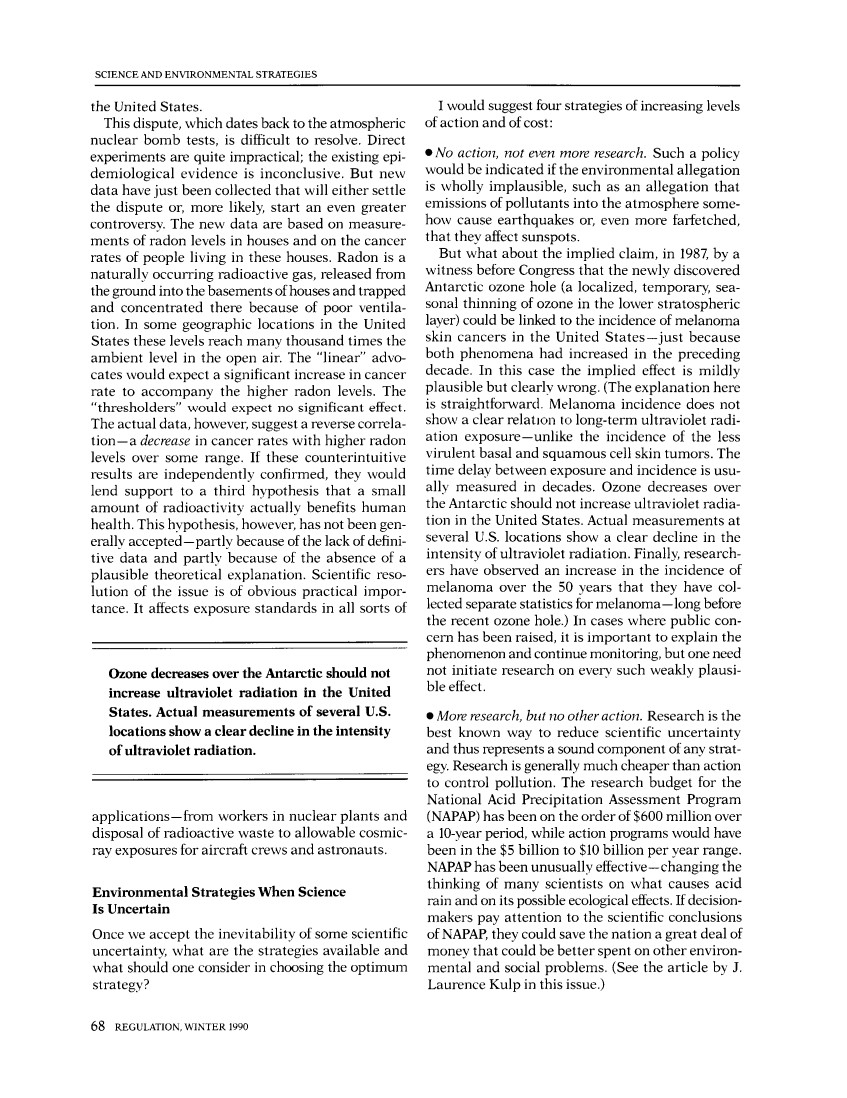

This is page 68 from The Cato Review of Business and Government 13. The article is called "Environmental Strategies with Uncertain Science" and is written by Fred Singer, an atmospheric physicist, fellow at the Heritage Foundation in the early 1980's, who consulted with companies such as Exxon, Shell, Unocal Sun Oil, and ARCO during the late 1970's. At the bottom of the page, Singer claims that avoiding premature action on acid rain saves 5 to 10 billion dollars. Singer's stance, which was taken over by the Reagan administration, was that legislation addressing acid rain were a billion-dollar solution to a million-dollar problem.
"The research budget for the National Acid Precipitation Assessment Program (NAPAP) has been on the order of $600 million over a 10-year period, while action programs would have been in the $5 billion to $10 billion per year range." (Singer, 1990)
Three years earlier his article "Ozone Scare Generates Much Heat, Little Light" in the Wall Street Journal of April 16 1987, he takes a position against action to regulate CFC's to prevent further damage to the Ozone layer. He distracts by pointing to other causes of skincancer.
"But there is no reliable evidence that the total amount of ozone has decreased, and any increase in the incidence of melanoma, the most serious type of skin cancer, must therefore involve other causes. Indeed, oncologists have proposed many such causes: viruses, genetic predisposition, environmental carcinogens, population shifts to the Sun Belt, changes in life style, earlier detection of melanomas, and even diet." (Singer, 1987)
Singer is also known for his battle against regulations concerning second hand smoke. He wrote a report for the Alexis de Tocqueville Institution in which he calls the 1993 Environmental Protection Agency's report on passive smoking bad science. "Unfortunately, in its zeal to abolish smoking, science has been sacrificed" (Singer, 1994).
In the June 30 1989 issue of National Review, Singer painted a rather peculiar picture of the scientific and environmental activist community. He describes the motivations of scientists to fight for regulations concerning CFC's as self-interest and personal glorification: "more grants for research; press conferences; and newspaper stories. Also the feeling that maybe they are saving the world for future generations." (Singer, 1989). As for environmental activists, Singer knows their hidden agenda, their quest to dismantle the economic system: "And then there are probably those with hidden agenda of their own -- not just to "save the environment" but to change our economic system. The telltale signs are the attack on free enterprise, the corporation, the profit motive, the new technologies. Some are socialists, some are Luddites. [...] Most of these "compulsive utopians" have a great desire to regulate -- on as large a scale as possible. To them global regulation is the " holy grail". That's what makes the CFC-ozone issue so attractive to them." (Singer, 1989)
Singer later worked to undermine political response to global warming. His latest publication dates 2009, when he co-wrote "Climate Change Reconsidered: 2009 Report of the Nongovernmental International Panel on Climate Change (NIPCC)", together with Craig Idso. He is founder of the Science & Environmental Policy Project (1990), a privately funded advocacy group questioning the prevailing scientific views on second hand smoke, ozone depletion and global warming. Former chairman of the board of directors was Frederick Seitz. SEPP received substantial industry funding, including contributions from Exxon [1], Shell, ARCO, Unocal, and Sun Oil. Singer aknowledged this himself during a 1994 appearance on the television show Nightline.
[1] SEPP received 10.000 dollars from Exxon in 1998.
Source: https://object.cato.org/sites/cato.org/files/serials/files/regulation/1990/1/v13n1-8.pdf
S. Fred Singer, "My Adventures in the Ozone Layer", National Review (June 30, 1989); pp. 34-38. No longer available on the website of the Science and Environmental Policy Project, founded by Singer, but viewable here